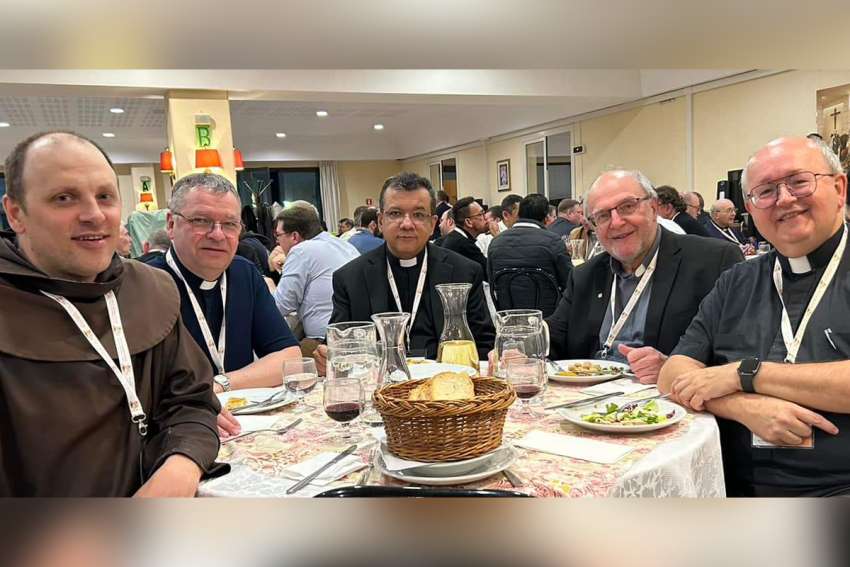Approximately “80 to 90 per cent” of the 100 priests invited tuned in for presentations from Frs. Fabio de Souza of Calgary, Pierre Ducharme, OFM., from Richmond, B.C and Quebec’s Daniel Ouellet, all of whom participated in the Vatican’s Parish Priests for the Synod spring meeting.
Attendees were then divided into 21 small groups for discussion. Each grouping featured four priests and one facilitator. All but four of the moderators — two priests and two religious sisters — were lay Catholics.
Fr. Raymond Lafontaine of the Archdiocese of Montreal recruited and trained the facilitators tasked with animating these “conversations in the Spirit.” He is experienced in this role, having moderated the international priest’s meeting. He will also steer the theological dialogues at the second session of the XVI Ordinary General Assembly of the Synod of Bishops in Rome this October.
Currently visiting Regina at Archbishop Donald Bolen’s invitation as he completes his six-month synodality-focused study sabbatical, Lafontaine said a crucial discussion in his group was the importance that the Church and the faith “break through the perception of decline and negativity” so Catholics feel stirred to heed their baptismal call.
“We are all disciples, and we are all missionaries,” said Lafontaine. “But how do you communicate that and help people catch on to the fact that this is their vocation? We also said the same thing about what it means to be a synodal Church. It's a word that does not yet have a lot of emotional resonance. Yet, when people experience it, they like it. They like feeling that their voice matters, that their experience matters, and that they are protagonists. They are not just passive.”
Fr. David John, who shepherds four parishes in the North Island pastoral area for the Diocese of Victoria, is a cleric with a penchant for storytelling. The national meeting participant, born and bred in England, relayed the importance of arming parishioners with agency by recounting his first encounter with a veteran sacristan at a parish in his home country.
John, stepping into the house of worship for the first time, met this woman in her late 80s. She possessed almost 70 years of experience functioning in her important behind-the-scenes position. He was caught off guard when she asked him how many Eucharistic hosts she should take out for the Mass.
“I said, ‘well, you've been doing it a long time; I'm sure you know better than I do,' ” recalled John. “(She replied), 'so how many should I put out?’ And this just went on and on. I asked her, ‘how many did you put out last week?’ She said, ‘70.’ I responded, ‘and was that enough?’ She said, ‘yes.’ I said, ‘so why don't you put out 70?’ And she asked, ‘do you want me to put out 70?’
“I thought, what have we done as a church to this poor woman that she doesn't feel sufficiently empowered to make that decision.”
One essential task is transforming hesitant congregants into dynamic and assured leaders. Another is encouraging skeptics of the synodal process to see this as a pursuit worth supporting.
Fr. Roger Niedzielski, the 32-year-old guiding the Assumption and Resurrection twinned parishes in Edmonton, recognized that “the Church finds itself with a challenge of credibility for various reasons,” which can naturally lead to Canadian Catholics having reservations about the way ahead.
In response to an oft-levelled critique that synodality is “cheap talk,” Niedzielski stressed that “it is important to acknowledge that we need to talk. Communication is key if we are going to do anything. We can’t dismiss communication and say ‘we need action.’ ”
Niedzielski, who served as his diocese’s coordinator for World Youth Day in 2023, added that it is also necessary to remember that this process will take time.
“I am a millennial priest,” said Niedzielski. “I like my SkipTheDishes, and I like for things to be sent once I place my order. I recognize this is the atmosphere we live in right now, but relationships, especially these types of relationships, take time. It is important to talk. Action will flow. Once hearts are converted and we have buy-in, it will be alive and change.”
Fr. Mark McGuckin, the pastor of St. Francis de Sales Church in Burnaby, B.C., said the key to courting the on-the-fence parishioners is ensuring a clear purpose for all meetings.
“It has to be something additional to just gathering, listening to each other and discerning,” said McGuckin. “Those will always be inherent. We could say, ‘we need you for this planning stage. We want to hear your voices.’ That added element could have some naysayers saying, ‘what are we doing — oh, there is a purpose and a goal here. It is not just about gathering.’ ”
All the priests interviewed by The Register said they found the national online gathering valuable and could be interested in another session early in 2025. Notes from the meeting are being assembled and will be submitted to the General Secretariat of the Synod of Bishops.


